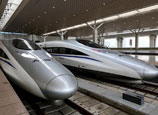
EASING POLICIES SHOULD CONTINUE TO BE IN PLACE
At the same time, some analysts pointed out that the PMI sub-index on new orders only inched up 0.1 percentage points, demonstrating that the momentum for bouncing back is not very stable.
Zhou Xiaochuan, governor of the People's Bank of China or the central bank, said that the global financial crisis will not be over soon, and new problems like the U.S. fiscal cliff will overcast the global economic development and bring more uncertainties to the Chinese economy.
Qu Hongbin said that as China is at the early stage of recovery and the global economic growth is still fragile, a rosy prospect for external demand is too early to say.
Moreover, the PMI reading of 50.4 was still lower than its average level of 51.7, and the sub-index on employment was below 50.
Hence, Qu called for a continuation of policy easing from Chinese policymakers to avoid a W-shaped recovery, or double-dip recovery.
His view was echoed by some other economists who believed that China should maintain liquidity via open market operations or reserve requirement ratio (RRR) cuts on the premise that inflation is well under control.
Lian Ping, who said that the policies for stabilizing growth should continue to be implemented, among which the fiscal policy should be neither too tight nor too relax and doesn’t need to be adjusted dramatically for the time being.















 Job interview for airline stewards
Job interview for airline stewards


![]()
